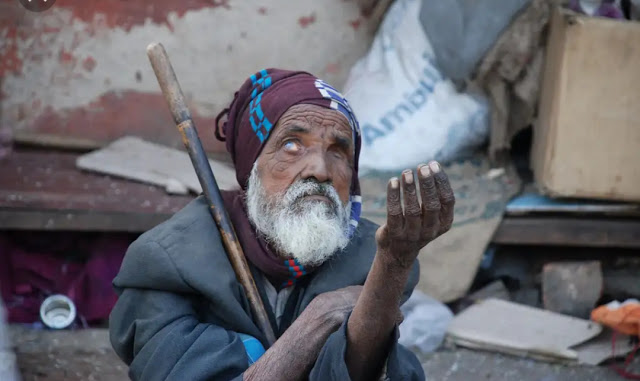As Jesus traveled the countryside preaching and healing, the question everyone asked was: “Who is this guy?”
John the Baptist was asking the same thing. One day, he tasked a couple of his own disciples to go have a talk with Jesus. Here’s how Luke describes the meeting:
John’s two disciples found Jesus and said to him, “John the Baptist sent us to ask, ‘Are you the Messiah we’ve been expecting, or should we keep looking for someone else?’”
At that very time, Jesus cured many people of their diseases, illnesses, and evil spirits, and he restored sight to many who were blind.
Then he told John’s disciples, “Go back to John and tell him what you have seen and heard—the blind see, the lame walk, those with leprosy are cured, the deaf hear, the dead are raised to life, and the Good News is being preached to the poor.”
And he added, “God blesses those who do not fall away because of me.” —Luke 7:20-23 (NLT)
As I read this, I imagined John’s disciples taking notes. Blind can see, check. Lame are walking, excellent. Curing leprosy, very impressive. Deaf are hearing… Hey, Larry, I need to get an appointment for my father-in-law. Good News preached to the poor…
“Wait. I missed something. What was that you said before the Good News thing? Did you say the dead are raised to life? The dead. Raised. To life. Are you serious, Jesus?!?”

And Jesus answers, “And, the Good News is preached to the poor.”
“Yeah, yeah, the poor. We get it. But the dead are raised? Like, up out of the ground back to life raised? You kinda buried the lede there, didn’t you, Jesus? Dead people walking and talking? Can you imagine the crowds you’d draw if we let people know that they can see their dead aunts and uncles again? Not that I’d want to see my mother-in-law ever again, bless her soul. But man, Jesus, this could get you some fantastic PR!”
And so on.
To bury the lede is newspaper-speak for shoving the most important part of a story deep down below paragraph fourteen where it’s bound to be overlooked. Is that what Jesus did here?
In the way that he describes what he’s doing, Jesus is asking John to accept him as God’s Messiah based on the fulfillment of these two prophesies by the prophet Isaiah:
“The Spirit of the Sovereign LORD is on me, because the LORD has anointed me to proclaim good news to the poor. He has sent me to bind up the brokenhearted, to proclaim freedom for the captives and release from darkness for the prisoners…” —Isaiah 61:1 (NIV)
Then will the eyes of the blind be opened and the ears of the deaf unstopped. Then will the lame leap like a deer, and the mute tongue shout for joy. —Isaiah 35:5-6a (NIV)
We read the Gospels and we’re pretty awed by the miracles Jesus performed. Awed and, honestly, a bit skeptical. The accounts of healings are serious sticking points for some of us in this “follow the science” age of hard-core materialism. But those miracles had an underlying purpose.
The vast majority of the people Jesus healed had been forced into a life of dependency on the kindness and mercy of others by their illnesses. The blind and paralyzed people Jesus healed sat by busy streets begging for money, lepers were forced to live in small communities away from others, a demon-possessed man lived among the graves outside of his hometown. They were among the poorest of poor, not only financially, but they were also impoverished by their very limited spiritual and social opportunities.
And, there were a great many healthy poor who were impoverished as a result of owing debts they could not repay or losing family-owned land they could no longer farm. Jesus wanted to give hope to the poor. He wanted them to know that God saw them, that God loved them, that despite their harsh circumstances they could be part of God’s heavenly family. He wanted to assure the myriad invisible citizens of Israel that repentance was the way to God’s heart—not money, not power, not theological learning. Jewish birthrights were going to be meaningless in the end. Repentant hearts were the birthrights that impressed God.
We may be in awe of Jesus’ miracles or we may be skeptical. Whatever your position, the healing miracles Jesus is known for were really only visible examples of the more widespread and hidden healing that God was doing through Christ, healing that he offers to all of us, healing that we desperately need. The Good News is that if we repent of our sins, God will heal us and make it possible for us to stand up straight, relieved of the weight of our failures, our harsh thoughts and words, and our hateful actions and attitudes. The Good News is that we can start over fresh, as if crippled legs had been made new again.
We are poor and in need of God’s mercy, though we may deny it. Jesus preaches Good News to we who are poor in goodness, kindness, righteousness, and love. The Good News of God’s forgiveness and the promise of being restored to his family is that we are given an opportunity to do life differently, to see ourselves, our family, our co-workers, our friends, even complete strangers as God sees them, and to live in whatever circumstances we are in with the knowledge that God sees us, loves us, and wants us to know him.




Comment Policy: All comments are subject to moderation. Your words are your own, but AnotherThink is mine, so I reserve the right to censor language that is uncouth or derogatory. No anonymous comments will be published, but if you include your real name and email address (kept private), you can say pretty much whatever is on your mind. I look forward to hearing from you.